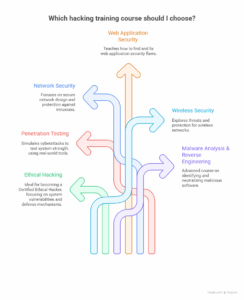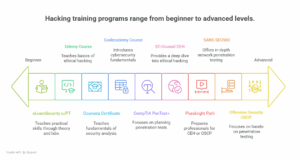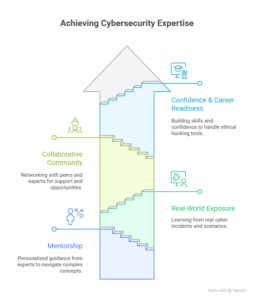In today’s digital era, cybersecurity has become a critical necessity for individuals, businesses, and governments alike. As cyber threats grow more complex, the demand for skilled professionals capable of securing systems is at an all-time high. Hacking training plays a pivotal role in preparing individuals to understand system vulnerabilities, detect potential breaches, and implement effective countermeasures.
Hacking training is not just about learning how systems are compromised—it’s about equipping learners with the skills to ethically test and defend them. From understanding how attackers think to mastering tools used in penetration testing and network security, these programs offer hands-on experience and real-world simulations. Whether you’re an aspiring cybersecurity expert or someone looking to strengthen your IT foundation, hacking training opens up a world of opportunities in the ever-growing field of ethical hacking and information security.
What is Hacking Training?
Hacking training refers to a structured learning program designed to teach individuals how to identify, exploit, and fix vulnerabilities in computer systems, networks, or applications. It goes beyond just technical skills—it’s about understanding how cyber attackers think and operate.
There are two major aspects: ethical hacking and cybersecurity defense. Ethical hacking, also known as penetration testing, is the legal and responsible side of hacking. Ethical hackers are hired by companies to simulate cyberattacks and uncover weaknesses before malicious hackers do.
A good hacking training course introduces key concepts such as network security, system architecture, programming basics, malware analysis, and common cyber threats. It also includes practical labs, real-time attack simulations, and hands-on usage of tools like Kali Linux, Metasploit, and Wireshark. These programs are designed to take even complete beginners from zero knowledge to a job-ready level in cybersecurity.
Whether your goal is to become a certified ethical hacker (CEH), work as a penetration tester, or simply understand how to protect digital assets, hacking training is the essential first step.
Importance in Today’s Cyber World
In an increasingly digital world, cyber threats have become more sophisticated, frequent, and damaging. From small businesses to global enterprises, no organization is immune to cyberattacks. This makes hacking training not just important—but essential.
Cybercriminals exploit system vulnerabilities, steal sensitive information, and disrupt operations. The global rise in ransomware attacks, phishing scams, and data breaches has created a massive demand for skilled cybersecurity professionals. Through hacking training, individuals gain the expertise needed to detect, prevent, and respond to these threats effectively.
Governments and corporations alike are investing in ethical hackers to safeguard their systems. By learning how hackers operate, ethical hackers can proactively find weaknesses and secure infrastructures before real damage occurs. It’s a skill set that is no longer optional, but a necessity in every IT and security strategy.
Whether you’re an aspiring cybersecurity professional or a business decision-maker, investing in hacking training today prepares you to face tomorrow’s digital battles with confidence.
Types of Hacking Training Courses

Explore the wide range of hacking training courses available today. Each course focuses on a specific area of cybersecurity to suit different career paths and skill levels.
Ethical Hacking
Learn the fundamentals of ethical hacking, including system vulnerabilities, attack vectors, and defense mechanisms. This course is ideal for those who want to become Certified Ethical Hackers (CEH).
Penetration Testing
Focuses on offensive security strategies, simulating cyberattacks to test the strength of systems and networks.Real-world penetration tools and frameworks are used in practical labs.
Network Security
Covers secure network design, configuration, monitoring, and protection against intrusions. Ideal for IT professionals looking to specialize in maintaining robust enterprise network environments.
Web Application Security
Teaches how to find and fix security flaws in web applications, such as SQL injection, cross-site scripting (XSS), and insecure authentication protocols.
Wireless Security
Explores threats and protection mechanisms for wireless networks including Wi-Fi hacking techniques and securing wireless infrastructure.
Malware Analysis & Reverse Engineering
A more advanced path focusing on identifying, dissecting, and neutralizing malicious software through technical investigation and forensic analysis.
Top Global Certifications in Hacking
A key part of advancing your cybersecurity career is earning globally recognized certifications. These credentials validate your expertise and make you a competitive candidate for high-level roles. Whether you’re starting your journey or specializing further, these certifications are often integrated into advanced hacking training programs.
Certified Ethical Hacker (CEH)
One of the most widely respected certifications, CEH is offered by EC-Council. This credential verifies that you have the skills to think and act like a hacker—legally. Many ethical hacking training courses are specifically designed to prepare candidates for the CEH exam.
Key Highlights:
-
Covers reconnaissance, scanning, system hacking, and malware threats
-
Recognized by government and private sector employers
-
CEH-certified professionals are in high demand worldwide
CompTIA Security+
This entry-level certification provides foundational knowledge in cybersecurity. It is ideal for those just starting hacking training and looking to build a solid understanding of security concepts before moving on to more technical certifications.
Key Highlights:
-
Focuses on network security, threats, vulnerabilities, and compliance
-
ISO/ANSI accredited
-
Widely accepted across industries as a baseline credential
Offensive Security Certified Professional (OSCP)
The OSCP certification, provided by Offensive Security, is one of the most technical and hands-on credentials in the ethical hacking world. Employers seeking penetration testers and red team specialists place a high emphasis on OSCP.
Key Highlights:
-
Requires completion of a 24-hour practical exam
-
Emphasizes real-world penetration testing scenarios
-
Integrated with advanced hacking training programs focused on offensive security
GIAC Penetration Tester (GPEN)
Offered by the SANS Institute, GPEN focuses on penetration testing methodologies. This certification suits professionals seeking to specialize in identifying and exploiting security weaknesses.
Key Highlights:
-
Covers legal issues, reconnaissance, scanning, and exploitation
-
Backed by one of the most credible cybersecurity training organizations
-
Often pursued after gaining some real-world hacking training experience
Certified Information Systems Security Professional (CISSP)
Though broader than pure hacking, CISSP is valuable for professionals aiming for leadership roles in cybersecurity. It is a high-level certification focusing on system architecture and management.
Key Highlights:
-
Ideal for security analysts, managers, and architects
-
Recognized as a gold standard in the field
-
Requires at least five years of experience in two or more fields of work.
Top 20+ Hacking Training Programs (2026 Edition)

Your cybersecurity adventure may take a drastic turn if you select the incorrect hacking training course. With the increasing demand for ethical hackers, professionals and beginners alike are seeking quality training that not only teaches theoretical knowledge but also offers hands-on experience. Below is a curated list of 20+ highly-rated hacking training courses from around the world that cater to various skill levels—from absolute beginners to experienced security professionals.
Each course listed offers a unique learning experience, covering areas such as ethical hacking, penetration testing, network security, cyber defense, and vulnerability assessment. These programs are recognized for their comprehensive curriculum, real-world labs, and globally acknowledged certifications. Whether you aim to work as a penetration tester, security analyst, or cybersecurity consultant, these hacking training programs can help you acquire the necessary skills to protect digital systems and infrastructures.
1. EC-Council Certified Ethical Hacker (CEH)
This internationally recognized certification offers a thorough understanding of ethical hacking. With over 20 modules, it covers topics like footprinting, system hacking, malware analysis, and cloud security.
2. Offensive Security Certified Professional (OSCP)
The OSCP, which is offered by Offensive Security, is regarded as one of the most difficult yet prestigious ethical hacking certificates. It focuses heavily on hands-on penetration testing through real-world labs.
3. CompTIA PenTest+
This vendor-neutral certification is ideal for intermediate learners. It focuses on planning and scoping penetration tests, as well as conducting and analyzing vulnerabilities.
4. SANS SEC560: Network Penetration Testing and Ethical Hacking
A course designed for advanced professionals, it offers in-depth knowledge of modern network penetration testing techniques, with a focus on real-world scenarios.
5. eLearnSecurity eJPT (Junior Penetration Tester)
A perfect starting point for beginners, eJPT teaches practical skills through a combination of theory and hands-on labs. It’s known for being beginner-friendly and affordable.
6. TryHackMe
This platform gamifies cybersecurity learning. It offers beginner to expert-level paths in ethical hacking, system exploitation, web hacking, and more.
7. Hack The Box Academy
Another popular hands-on platform, Hack The Box offers structured learning paths for penetration testing, red teaming, and bug bounty preparation.
8. Udemy – The Complete Ethical Hacking Course
Affordable and beginner-friendly, this Udemy course teaches the basics of ethical hacking, information gathering, and exploitation.
9. Coursera – IBM Cybersecurity Analyst Professional Certificate
A great option for beginners looking for a structured academic approach. It teaches the foundations of ethical hacking and security analysis.
10. Cybrary – Ethical Hacking Courses
Cybrary offers a broad selection of hacking courses, covering everything from beginner content to advanced penetration testing and red team operations.
11. Offensive Security Wireless Attacks (OSWP)
A specialized course focusing on wireless networks, OSWP teaches how to exploit WEP, WPA, and other wireless security protocols.
12. MIT Cybersecurity Short Course
This professional course teaches high-level hacking strategies in enterprise environments. It’s ideal for managers and senior professionals.
13. INE’s Cybersecurity Path
INE offers structured learning for various tracks, including ethical hacking, red teaming, and defensive security. It’s highly technical and hands-on.
14. Elysium Academy – Ethical Hacking Training in Madurai
A regional leader in hacking training, Elysium Academy offers CEH-aligned courses with expert mentorship and real-time lab sessions for students in India.
15. Codecademy – Introduction to Cybersecurity
The foundations of ethical hacking and cybersecurity are covered in this self-paced course. It’s ideal for beginners exploring this career path.
16. EC-Council Certified Network Defender (CND)
This course is focused on network security from a defender’s perspective. It’s suitable for IT professionals wanting to add security expertise to their portfolio.
17. Google Cybersecurity Professional Certificate (Coursera)
This beginner-friendly course introduces job-ready skills in cybersecurity. It covers essential hacking techniques, tools, and best practices.
18. InfoSec Institute Boot Camps
These short-term hacking training boot camps are designed for rapid skill development. They include exam vouchers and live instructor-led training.
19. StationX – The Complete Cyber Security Course Series
A four-part training series covering everything from network security to advanced penetration testing and social engineering.
20. Pluralsight – Ethical Hacking Path
Ideal for professionals preparing for CEH or OSCP. It includes video-based learning and labs that focus on hands-on skills.
21. EdX – Cybersecurity MicroMasters by RIT
An academic approach to cybersecurity, this MicroMasters program offers deep dives into ethical hacking, forensics, and risk management.
Benefits of Learning from Experts

Importance of Mentorship, Guidance, and Community Support
When it comes to hacking training, learning from experienced professionals provides a strong foundation for success in the cybersecurity domain. Experts bring real-world insights, industry-relevant scenarios, and hands-on methodologies that go far beyond theoretical knowledge.
Mentorship That Accelerates Growth
Mentors offer personalized learning strategies, help you navigate complex concepts, and prepare you for high-pressure cybersecurity challenges. Professional advice guarantees you’re headed in the correct direction, regardless of your level of experience or your shift from IT to cybersecurity.
Real-World Exposure
Trainers who are active in the field provide examples from real cyber incidents, red teaming, penetration testing, and live threat analysis. This helps learners understand how to detect vulnerabilities, respond to breaches, and secure digital infrastructures effectively.
Access to a Collaborative Community
Joining a professional hacking training program often includes entry into a community of peers, experts, and alumni. This network can be a rich resource for career advice, project collaboration, certification preparation, and job opportunities.
Confidence & Career Readiness
Expert-led training helps build the confidence to handle ethical hacking tools like Metasploit, Wireshark, Burp Suite, and Nmap. Through guided labs, simulated attacks, and red/blue team activities, learners gain job-ready skills that stand out in the job market.
By enrolling in a hacking training program with seasoned mentors, you’re not just learning techniques—you’re gaining a competitive edge in the rapidly evolving field of cybersecurity.
Elysium Academy’s Hacking Training Advantage
Local Coaching, Certifications, and Hands-on Projects
Elysium Academy stands out as a premier destination for hacking training with its unique blend of expert instruction, practical exposure, and career-focused learning pathways.
Local Coaching with Global Standards
For those searching for hacking training near them, Elysium Academy offers the advantage of in-person guidance with the standards of top international institutions. Learners benefit from real-time interaction, immediate feedback, and a structured classroom environment that accelerates learning.
Industry-Recognized Certifications
Elysium Academy prepares students for globally respected certifications like CEH (Certified Ethical Hacker), CompTIA Security+, and OSCP, boosting their professional credibility. These certifications validate your expertise and open doors to roles in ethical hacking, cybersecurity analysis, and penetration testing.
Hands-on Project-Based Learning
Every module is backed by practical labs, simulations, and real-world case studies. Learners apply concepts such as network scanning, system exploitation, and vulnerability assessment in a controlled lab environment—ensuring they are job-ready from day one.
Career Support and Continuous Mentorship
Elysium Academy offers placement assistance, career workshops, and one-on-one mentoring sessions to help students transition from learners to cybersecurity professionals. From resume building to interview preparation, every step is guided by seasoned experts.
By choosing Elysium Academy’s hacking training, you gain not only skills but a full support ecosystem that helps you succeed in the competitive world of cybersecurity.
Frequently Asked Questions About Hacking Training
1. What is hacking training, and who should consider it?
Hacking training refers to a structured learning program that focuses on ethical hacking techniques, security analysis, and digital forensics. This training is designed for anyone interested in cybersecurity, including students, IT professionals, system administrators, and ethical hacking aspirants. Whether you’re starting your tech career or looking to switch domains, hacking training equips you with the skills needed to protect systems and networks from malicious attacks.
2. Is hacking training legal and safe to pursue?
Yes, absolutely. Hacking training, when done through certified and ethical platforms, is entirely legal and beneficial. Ethical hacking focuses on identifying vulnerabilities in systems to improve security. The goal is to learn how attackers think so you can defend against them. Legal hacking training programs also emphasize cybersecurity laws and industry best practices, ensuring you’re learning in a safe and responsible way.
3. Do I need any prior experience to join a hacking training course?
Not necessarily. Many beginner-level training courses are available that start with fundamental IT concepts like networking, operating systems, and security principles. Advanced programs may require some background in programming or system administration, but most hacking training institutes offer a step-by-step approach to help learners build foundational knowledge before diving into complex tools and techniques.
4. How long does it take to complete hacking training?
The duration of hacking training depends on the program and the learner’s pace. Short-term workshops and bootcamps may last a few weeks, while comprehensive certification courses such as CEH (Certified Ethical Hacker) or OSCP can take several months. Institutes offering flexible schedules allow learners to balance training with work or studies, making it accessible for both part-time and full-time learners.
5. What tools and skills will I gain during the training?
A good hacking training program covers a range of tools and practical skills. Learners typically get hands-on experience with platforms like Kali Linux, Metasploit, Burp Suite, Wireshark, and Nmap. Alongside tools, you’ll master skills like penetration testing, vulnerability assessment, network security, system hardening, and social engineering—all crucial for real-world cybersecurity roles.
In today’s digitally driven world, the demand for skilled cybersecurity professionals continues to grow. Whether you’re a student exploring new career paths or an IT professional upgrading your skill set, hacking training offers a powerful gateway into one of the most crucial sectors of the tech industry. From ethical hacking to advanced penetration testing, structured training empowers you to not only understand the tactics of cyber attackers but to outsmart them legally and ethically.
Choosing the right hacking training course can transform your understanding of networks, systems, and digital vulnerabilities. More importantly, it opens the door to global certifications, high-paying job roles, and an impactful career defending digital infrastructure.
With hands-on learning, expert mentorship, and the right certifications, you’ll be well-prepared to become a cybersecurity professional the industry can trust. Elysium Academy, with its focused training programs and real-time labs, helps aspiring learners become confident ethical hackers ready to meet the demands of the modern world.
Take the first step today—enroll in a reputable hacking training course and secure your future in the ever-evolving field of cybersecurity.













